In various industrial applications, pumps play a crucial role in transferring fluids, whether it’s water, chemicals, or slurries.
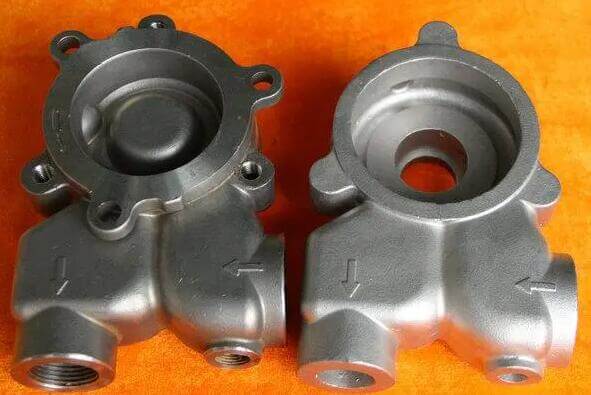
Among the wide range of pump options available, the Warman D108 slurry pump stands out for its efficiency and reliability.
This article delves into the characteristics of the Warman D108 pump, the significance of stainless steel in pump parts casting, and highlights leading manufacturers in the industry.
Contents
Understanding the Warman D108 Pump
Overview of Warman Pumps
Warman pumps have established a formidable reputation in the pump industry, particularly for handling abrasive and corrosive materials.
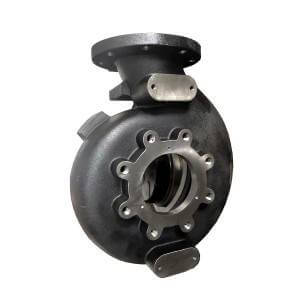
Originally developed by Warman International, these pumps are engineered for durability and performance in the most demanding environments.
The Warman D108 pump is specifically designed to handle heavy-duty slurry applications, making it a popular choice in industries such as mining, minerals processing, and wastewater treatment.
Key Features of the Warman D108
- Design and Construction:
- The Warman D108 is constructed with a robust design, featuring heavy-duty casings to withstand high pressure and abrasive conditions. The pump typically consists of a metal casing, impeller, and shaft.
- Material Selection:
- The D108 utilizes high-quality materials, including stainless steel, for components that require enhanced corrosion resistance and durability.
- Flow Capacity:
- Designed to handle large volumes of slurry, the Warman D108 can manage flow rates that are essential for large-scale industrial applications.
- Efficiency:
- The D108 pump is engineered to provide optimal hydraulic performance, reducing energy consumption while maintaining high efficiency.
- Maintenance Features:
- The design of the D108 incorporates features that facilitate easy maintenance and repairs, reducing downtime and operational costs.
Applications of the Warman D108 Pump
The Warman D108 pump is utilized across various industries due to its robust performance in challenging environments.
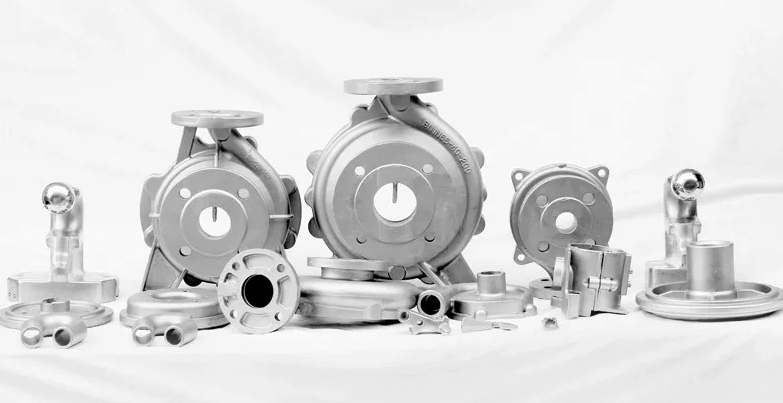
Some common applications include:
- Mining and Mineral Processing:
- In the mining sector, the D108 is employed for transporting slurry containing minerals, ore, and waste materials.
- Chemical Processing:
- The pump is also suitable for handling chemicals, ensuring the safe and efficient transfer of corrosive liquids.
- Wastewater Treatment:
- In municipal and industrial wastewater treatment facilities, the D108 is used to pump sludge and other viscous materials.
- Power Generation:
- The D108 is employed in power plants for ash handling and water treatment processes.
- Construction and Civil Engineering:
- In construction, the pump is used for dewatering and managing sediment-laden water.
The Role of Stainless Steel in Pump Parts Casting
Importance of Material Selection
The selection of materials for pump components significantly impacts performance, durability, and resistance to wear and corrosion.
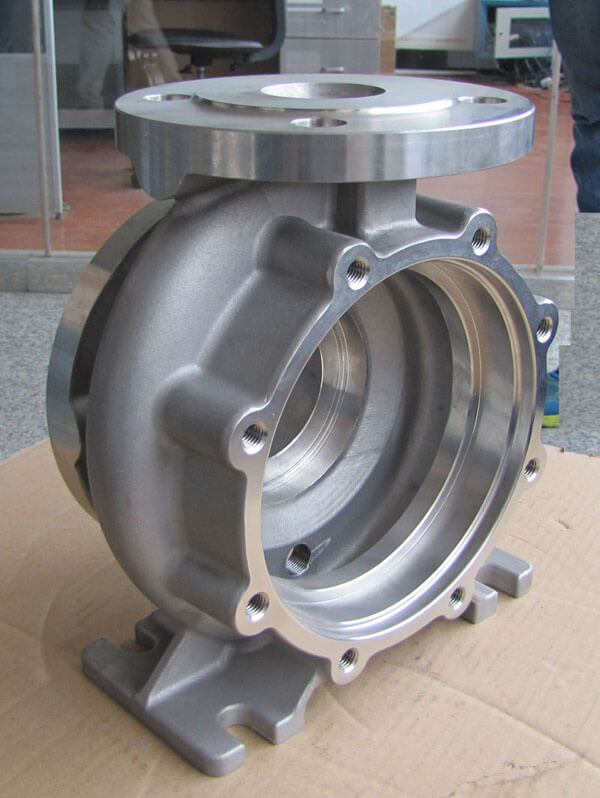
Stainless steel is increasingly favored in the manufacturing of pump parts due to its unique properties.
Advantages of Stainless Steel
- Corrosion Resistance:
- Stainless steel exhibits remarkable resistance to corrosion, making it ideal for handling corrosive fluids and environments.
- Strength and Durability:
- Stainless steel offers high tensile strength, allowing for the production of robust and long-lasting components that can withstand harsh operational conditions.
- Ease of Fabrication:
- The material can be easily molded and fabricated into complex shapes, making it suitable for intricate pump designs.
- Aesthetic Appeal:
- Stainless steel provides an attractive finish, which is an added advantage in applications where appearance matters.
- Hygienic Properties:
- Stainless steel is non-reactive and easy to clean, making it suitable for applications in food processing and pharmaceuticals.
Stainless Steel Pump Parts Casting Processes
Overview of Pump Parts Casting
Casting is a widely used manufacturing process for creating pump parts, particularly in the production of complex geometries that require precision.
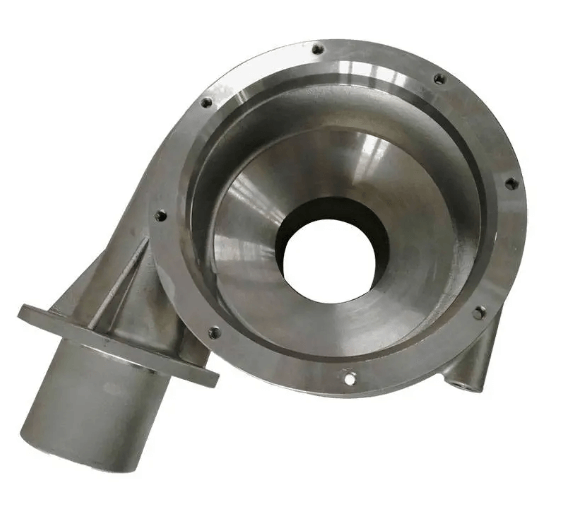
There are several casting methods employed in the industry, with investment casting and sand casting being the most prevalent.
Investment Casting
- Definition:
- Investment casting, also known as lost wax casting, is a precision casting process where a wax pattern is created, coated with a ceramic shell, and then filled with molten metal.
- Process Steps:
- Pattern Creation: Wax patterns of the pump parts are created using molds.
- Shell Building: The wax patterns are coated with a ceramic material to form a hard shell.
- Wax Removal: The shell is heated to melt and drain away the wax, leaving a mold cavity.
- Metal Pouring: Molten stainless steel is poured into the mold to create the pump parts.
- Shell Removal: Once cooled, the ceramic shell is removed to reveal the finished stainless steel components.
- Finishing: Final machining and finishing processes are carried out to achieve the desired specifications.
- Advantages of Investment Casting:
- High precision and detail
- Excellent surface finish
- Ability to produce complex shapes
- Reduced need for secondary machining
Sand Casting
- Definition:
- Sand casting is a process in which sand is used as the mold material. It is suitable for producing larger components at a lower cost.
- Process Steps:
- Mold Creation: A sand mold is created using patterns made of metal or plastic.
- Metal Pouring: Molten stainless steel is poured into the sand mold.
- Cooling and Solidification: The metal cools and solidifies within the mold.
- Mold Removal: The sand mold is broken away to extract the cast component.
- Advantages of Sand Casting:
- Cost-effective for large production runs
- Flexibility in mold design
- Suitable for larger components
Key Manufacturers of Stainless Steel Pump Parts Casting
The market for stainless steel pump parts is competitive, with various manufacturers specializing in casting and producing high-quality components for pumps. Below are notable manufacturers known for their expertise in stainless steel casting for pump applications.
- Hengke Precision Metal
- Overview: Hengke Precision Metal is a leading manufacturer specializing in precision casting, machining, and assembly of pump components. They offer a range of stainless steel casting solutions tailored to specific customer requirements.
- Capabilities: With state-of-the-art facilities and a commitment to quality, Hengke produces high-performance stainless steel pump parts using advanced manufacturing techniques, including investment casting.
- Dongying Arete Casting Company
- Overview: Dongying Arete Casting is known for its expertise in producing stainless steel components for various industrial applications, including pumps. The company utilizes advanced casting methods to ensure high-quality products.
- Capabilities: The manufacturer focuses on delivering customized solutions, meeting the specific needs of clients in sectors such as mining, chemical processing, and wastewater treatment.
- Shandong Omicron Casting Co., Ltd.
- Overview: Shandong Omicron is recognized for its commitment to producing high-quality stainless steel castings for pumps and other applications. Their manufacturing processes adhere to international quality standards.
- Capabilities: The company offers a diverse range of stainless steel pump parts, leveraging investment and sand casting methods to create durable components.
- Zhejiang Hongyu Casting Co., Ltd.
- Overview: Zhejiang Hongyu specializes in the production of castings for various industries, including pumps. They focus on providing high-quality stainless steel components that meet stringent performance criteria.
- Capabilities: The company employs advanced casting technologies and rigorous quality control measures to ensure the reliability of their pump parts.
- Cangzhou Great Pipe Co., Ltd.
- Overview: Cangzhou Great Pipe is a prominent manufacturer of pipe fittings and castings, including stainless steel pump components. They have established a strong reputation for delivering high-quality products.
- Capabilities: With a focus on innovation and customer satisfaction, the company offers a range of stainless steel casting solutions for the pump industry.
Trends and Innovations in Pump Manufacturing
Advancements in Pump Design
The pump manufacturing industry continually evolves with advancements in design and technology. Some key trends and innovations include:
- Smart Pumping Solutions:
- The integration of smart technologies, such as IoT sensors, enables real-time monitoring and data collection, improving operational efficiency and predictive maintenance.
- Energy Efficiency:
- Manufacturers are focusing on creating pumps that consume less energy while delivering optimal performance. This includes the development of more efficient impellers and hydraulic designs.
- Modular Designs:
- Modular pump designs allow for easier maintenance and component replacement, reducing downtime and costs associated with pump repairs.
- Sustainable Manufacturing:
- Manufacturers are increasingly adopting sustainable practices, such as using recycled materials and implementing eco-friendly manufacturing processes.
- Advanced Materials:
- The use of advanced materials, including high-performance alloys and composites, is gaining popularity in pump manufacturing to enhance durability and resistance to wear.
Quality Control in Pump Manufacturing
Quality control is a critical aspect of pump manufacturing, ensuring that products meet industry standards and customer expectations. Key quality control measures include:
- Material Testing:
- Rigorous testing of raw materials, including stainless steel, ensures compliance with specifications for strength and corrosion resistance.
- Dimensional Inspection:
- Automated and manual inspections are conducted to verify the dimensions and tolerances of pump components, ensuring precise fit and functionality.
- Performance Testing:
- Pump performance is evaluated through hydraulic testing to ensure that the pump operates within specified parameters for flow and pressure.
- Surface Finish Inspection:
- The surface finish of pump parts is inspected to prevent issues such as wear, corrosion, and fluid leakage.
- Certification and Compliance:
- Manufacturers often seek certifications, such as ISO 9001, to demonstrate adherence to quality management systems and best practices.
The Future of Pump Manufacturing
Industry Challenges
The pump manufacturing industry faces several challenges that require innovative solutions. Some of these challenges include:
- Supply Chain Disruptions:
- Global supply chain issues can impact the availability of raw materials and components, affecting production timelines and costs.
- Regulatory Compliance:
- Increasingly stringent environmental regulations require manufacturers to adapt their processes and products to meet compliance standards.
- Competition:
- The pump industry is competitive, with numerous manufacturers vying for market share. Continuous innovation and quality improvement are essential to remain competitive.
- Talent Shortages:
- The industry faces a shortage of skilled workers, necessitating investments in training and development programs to build a competent workforce.
Opportunities for Growth
Despite these challenges, the pump manufacturing industry also presents numerous opportunities for growth:
- Emerging Markets:
- Developing economies present significant opportunities for pump manufacturers as infrastructure projects and industrialization increase demand for pumping solutions.
- Technological Advancements:
- Embracing advancements in automation, digitalization, and smart technologies can enhance operational efficiency and product offerings.
- Sustainability Initiatives:
- As industries prioritize sustainability, manufacturers can develop eco-friendly pumping solutions that meet market demands for greener alternatives.
- Customized Solutions:
- The growing trend toward customization provides manufacturers with the opportunity to tailor products to meet specific customer needs and applications.
Conclusion
The Warman D108 slurry pump exemplifies the critical role of pumps in various industrial applications. Its robust design, efficiency, and reliability make it a preferred choice in handling challenging slurry environments. Additionally, the significance of stainless steel in pump parts casting cannot be overstated, as it contributes to the durability and performance of these components.
As the pump manufacturing industry continues to evolve, manufacturers must adapt to emerging trends and challenges. By focusing on quality control, sustainability, and technological advancements, companies can position themselves for growth and success in an increasingly competitive landscape.
With a commitment to excellence and innovation, leading stainless steel pump parts casting manufacturers are well-equipped to meet the demands of the industry and deliver high-quality solutions for their customers.
FAQ Section
- What is the Warman D108 pump?
- The Warman D108 is a heavy-duty slurry pump designed for industrial applications, known for its efficiency, durability, and ability to handle abrasive materials.
- What are the advantages of stainless steel in pump parts?
- Stainless steel offers corrosion resistance, high strength, ease of fabrication, aesthetic appeal, and hygienic properties, making it ideal for pump applications.
- What casting processes are commonly used for pump parts?
- Investment casting and sand casting are the two primary methods used for manufacturing pump components, each with its own advantages.
- Who are the leading manufacturers of stainless steel pump parts casting?
- Notable manufacturers include Hengke Precision Metal, Dongying Arete Casting Company, and Shandong Omicron Casting Co., Ltd.
- How does investment casting work?
- Investment casting involves creating a wax pattern, coating it with a ceramic shell, removing the wax, and then pouring molten metal into the shell to create the final part.
- What industries use the Warman D108 pump?
- Common applications include mining, chemical processing, wastewater treatment, power generation, and construction.
- What are the key trends in pump manufacturing?
- Trends include the integration of smart technologies, a focus on energy efficiency, modular designs, sustainable manufacturing practices, and the use of advanced materials.
- What quality control measures are implemented in pump manufacturing?
- Quality control includes material testing, dimensional inspection, performance testing, surface finish inspection, and certification for compliance with industry standards.
- What challenges does the pump manufacturing industry face?
- Challenges include supply chain disruptions, regulatory compliance, competition, and talent shortages in the workforce.
- What opportunities exist for growth in the pump manufacturing industry?
- Opportunities include emerging markets, technological advancements, sustainability initiatives, and the demand for customized solutions.
